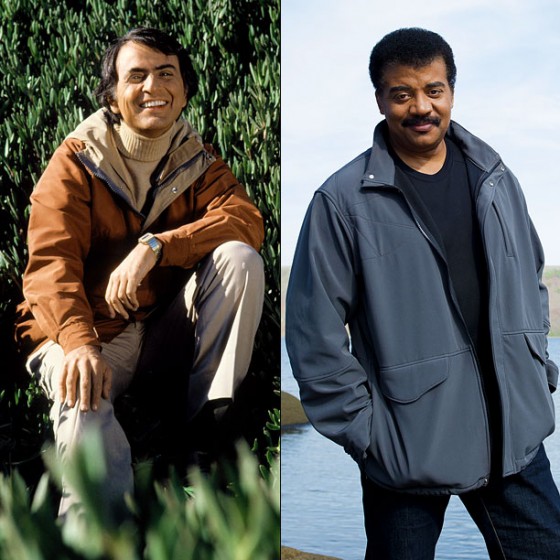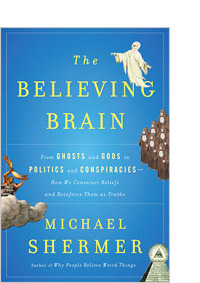by
Donald Prothero, Jun 11 2014

Ep 1 of Cosmos, “Waking Up in the Milky Way” aired 14 weeks ago. Those TV signals are now entering the Oort Cloud of comets.
-Neil deGrasse Tyson
After 14 weeks, “Cosmos” has finally aired all its original 13 episodes (with one week off on Memorial Day weekend). Now that it’s over, we can step back and assess it for its intrinsic value, and also for its possible effects on culture.
When Episode 1 first aired, there were a mix of reactions. Most of us were overwhelmingly positive about what we saw in the first episode, with the state-of-the art special effects as they tour the universe contrasted with the deliberately crude animations that portray historical figures and events. There were a lot of nitpickers who were horrified about the small scientific errors in the first episode. True, there should be no sound in the vacuum of space, and the asteroid belt or the Oort cloud are not as tightly packed with objects as the animation suggests. But most reviewers regarded those things as minor errors which don’t detract from the overall message, and are only noticeable to the relevant experts. The nitpickers missing the point: Modern lay audiences, conditioned by generations of sci-fi movies with dense clusters of objects and sound in space, wouldn’t even know how to comprehend something which was TOO accurate. Personally, I would have liked to have seen them be more careful about particular geological and paleontological details. I cringed when they put Early Permian Dimetrodon in the landscape of the Late Permian extinction, and other prehistoric anachronisms; I wish someone had coached them to pronounce Bruce Heezen’s name properly (HAY-zen, NOT HEE-zen); I wish they had presented a more pluralistic and accurate account of the Cretaceous extinctions, instead of the simplistic “asteroid did it—end of story” version so popular in the media, but not supported by the evidence. Continue reading…
comments (15)
by
Donald Prothero, Mar 12 2014

Like many scientists, for over a year I’ve been anxiously awaiting the first episode of the new version of “Cosmos,” starring Neil DeGrasse Tyson. A reboot of the classic series originally done by Carl Sagan in 1980, this version is co-written and co-produced by Sagan’s widow Ann Druyan. It is also co-produced by “Family Guy” creator Seth Macfarlane and by Jason Clark (producer of “42”, “Ted”, and the newly released “Mr. Peabody and Sherman”, which premiered the same weekend; he’s married to former actress Kimberly Beck, a high-school classmate of mine). I figured with these people at the helm, and Tyson as the spokesperson, they would not disappoint. But I was not prepared for how amazing the first episode turned out, even given those high expectations.
It aired on Sunday, March 9, on Fox, which had me a bit concerned, given the political bent of their news network, but this was because Macfarlane has good connections at Fox thanks to “Family Guy”. As the evening started, I was watching my Facebook feed and Twitter to see the reactions from those who saw it in all the time zones before I got my chance in Pacific Daylight Time. I was a bit worried to see a few of my Facebook friends didn’t like the show, but overall it seemed that most of them loved it. Finally, we got the kids to bed and it aired at 9:00 p.m. our time. This is mighty late if they wanted to reach anyone under 12, or for early-to-bed, early-to-rise people like me who get up before 6:00 a.m. It is especially so since we had just gotten the change to Daylight Saving Time that same morning, and most of our biological clocks were out of whack. Continue reading…
comments (29)
by
Michael Shermer, Apr 10 2012
Recently my friend and colleague in science and skepticism Neil deGrasse Tyson, issued a public statement via BigThink.com in which he stated that he dislikes labels because they carry with them all the baggage that the person thinks they already know about that particular label, and thus he prefers no label at all when it comes to the god question and simply calls himself an agnostic.

The Believing Brain
by Michael Shermer
In this book, I present my theory on how beliefs are born, formed, nourished, reinforced, challenged, changed, and extinguished. Sam Harris calls The Believing Brain “a wonderfully lucid, accessible, and wide-ranging account of the boundary between justified and unjustified belief.” Leonard Mlodinow calls it “a tour de force integrating neuroscience and the social sciences.”
I have already written about this many times over the decades, and my 1999 book How We Believe outlines in detail why I too hate labels. In fact, in my later book, The Mind of the Market, I explained why I also do not like the label “libertarian” because people automatically think this means believing something that I very likely do not believe (e.g., that humans are by nature purely selfish, that we have no moral obligation to help others in need, that greed is the only motive that counts in business, and that Ayn Rand was actually the Messiah), and instead I prefer to go issue by issue. Nevertheless, the label “libertarian” and “atheist” stick, and as I explained in my latest book, The Believing Brain, I’ve largely given up the anti-label struggle and just call myself by these labels. In effect, what I once thought of as intellectual laziness on the part of my interlocuters who did not seem to want to bother to actually read my clarifications and what, exactly, I do believe about this or that issue, I now see as the normal process of cognitive shortcutting. Time is short and information is vast. Most of the time our brains just pigeonhole information into categories we already know in order to move on to the next problem to solve, such as why not one Mexican restaurant band I have ever asked seems to know one of the greatest Spanish pieces ever produced: Malagueña. It’s a riddle wrapped in a mystery inside a tortilla. Continue reading…
comments (352)



